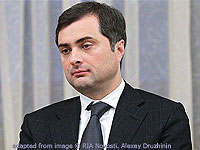The man behind the curtain: Do people miss Surkov? Or do they miss the illusions he created?

(Moscow News – Anna Arutunyan – Anna Arutunyan is a correspondent and editor at themoscownews.com – May 20, 2013)
It’s been two weeks since Vladislav Surkov left the government amid a swirl of subterfuge and guesswork. The man himself was soon off fishing with Ramzan Kadyrov in Chechnya, but the questions of why he left and what will happen now won’t abate.
This week, Deputy Prime Minister Arkady Dvorkovich, a leading liberal in Russia’s government, found himself reiterating that yes, Surkov left of his own accord, and that no, there’s nothing to see here, ma’am. Surkov himself has remained characteristically silent.
Here’s what struck me about the ongoing reaction to Surkov’s resignation: the flurry of sincere dismay given the demonization of Surkov we’ve seen in the past.
First, there were girlish freakouts on Twitter, with @pwnographyy “screaming/crying about Surkov’s resignation #nocalls #getmesomeicecream.” It’s not like Russia watchers were wallowing in their pajamas, eating chocolate and watching “Sex and the City” when another powerful liberal in Putin’s administration, Alexei Kudrin, resigned in fall 2011, so what happened?
Fortunately, the fangirl phenomenon has a simple answer: Aside from being tall, dark and handsome, Surkov made Russian politics fun in a way that Byzantine intrigue never has been before. He’s theatrical and thuggish at the same time, he hangs out with Kadyrov, and he listens to Tupac. He made watching Russian politics more entertaining than watching “House of Cards.”
The expression of dismay that really stood out came from analysts and security experts. Moscow News contributor Mark Galleoti was reflecting a consensus when he tweeted, immediately after Surkov’s resignation, “Farewell Surkov; the dumbing-down of the Russian government continues.”
Longtime critics of Putin’s administration and, by definition, of Surkov’s policies pointed to a trend of more blunt, Soviet-like, and repressive measures when it came to handling the opposition and rallying support for the regime. That trend began in late 2011 at the height of the anti-government protest movement. It was, in fact, at that moment back in 2011 when Surkov was demoted and replaced by more straightforward United Russia functionary Vyacheslav Volodin.
As I’ve written before, it was then that the Kremlin started tapping into Russia’s equivalent of the guns and God crowd the Christian fundamentalists in its bid to forge a national identity. No more subtle political spin, no more mystifying ideologies like Surkov’s sovereign democracy doctrine.
If Surkov’s ultimate departure meant a blunter form of authoritarianism, then why was he seen for so long as a kind of Darth Sidious, sent by the dark side to corrupt Russia’s democratic process and bolster authoritarian rule? His sovereign democracy concept, when it appeared in 2005, was criticized for being statist and for justifying election rigging. And in September 2011, when billionaire Mikhail Prokhorov was ousted by Kremlin functionaries from his liberal Right Cause party, which Surkov played a direct role in forming, Prokhorov blamed it on him and called him a “puppeteer.”
Now that Surkov is out of the picture, however, it’s becoming increasingly clear that there was hardly any true democratic process to begin with. Certainly not after President Boris Yeltsin shelled parliament in 1993 and created a presidency with near dictatorial powers. Surkov, it appears in hindsight, was a PR executive brought in for an extremely difficult and precarious job: creating a semblance of democracy and political pluralism where there was none.
To keep up that balancing act takes spectacular cynicism, and not the good kind. It seems that Surkov’s increasing belief in pluralism and the Freudian slips he made in 2011 praising the antigovernment protesters led to his undoing. Kremlin sources cited in the Russian media are pointing to Surkov’s behind-the-scenes support of opposition figures like Ilya Ponomaryov as the tipping point that led to his ousting. Some are of the opinion that Surkov supported a second presidential term for Medvedev, which, if true, spelled the end of his Kremlin career after Putin’s return.
Either way, it’s not dismay at Surkov’s ousting that we’re seeing. It’s dismay over the fact that the pretty gauze curtain he symbolized has been snatched away, revealing how things really work.
